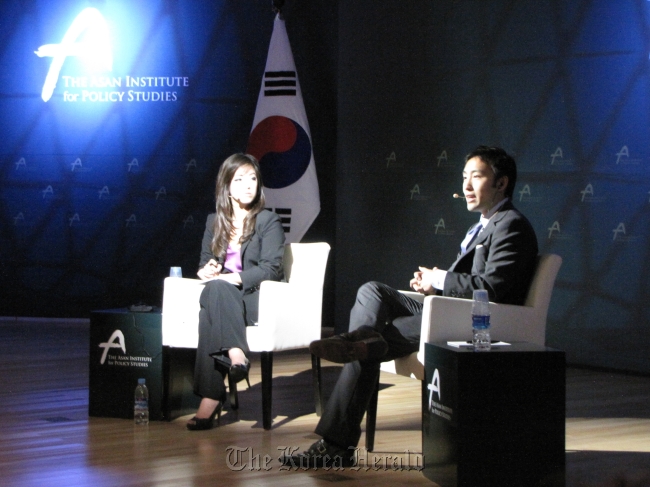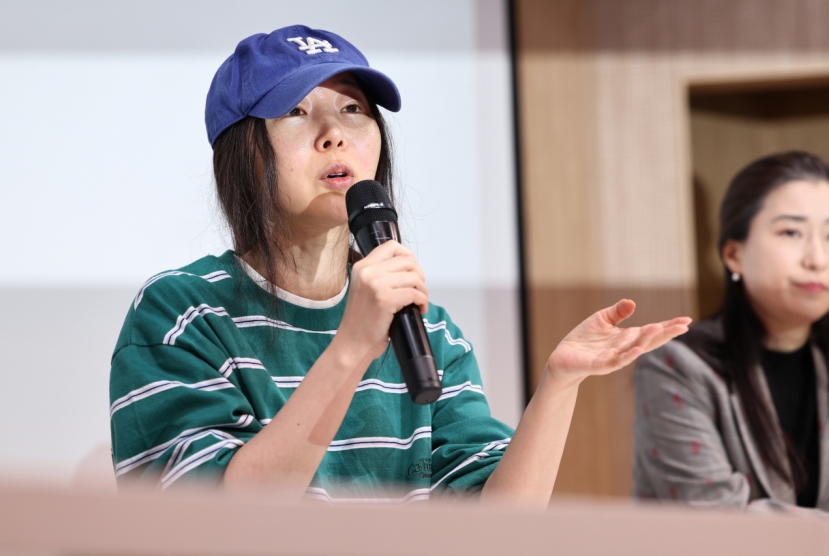Film gives voice to Korean-Americans separated from relatives in N.K.
When Korean-American Jason Ahn’s grandmother was hospitalized with stomach cancer in the U.S., she longed to see her sister in North Korea once more before she died.
But she was unable to make the trip in response to her sister’s letter, and died without speaking to her sibling again.
“For a reply, we had no other choice but to send her funeral photos to her sister,” recounted Ahn in an introduction to the new “Divided Families” documentary he has now directed on the issue.
“Her tragic story belongs to our own, but I have realized that there are many similar stories like that of the Korean immigrants in America. As the second-generation Korean-American, I see it’s necessary to produce a film that exposes their tragic reality to the American public and speaks for them in the future.”
The Harvard Medical School and Harvard Kennedy School student temporarily put his schooling on the back burner to give voice to the anguish of the more than 100,000 American citizens of Korean heritage separated from immediate family members still living in North Korea.
The film that Ahn directed along with Eugene Chung focuses on Korean families who are now living in the U.S., divided from their North Korean relatives by the Korean War.
The narrative follows the diverse stories of five Koreans who emigrated to the U.S., leaving loved ones behind in North Korea.
The footage ranges from a visit to Pyonyang by Won Guk-yun, who managed to see his two sisters there, to tireless campaigning by Divided Families activist Chahee Stanfield, to the sad story of taxi driver Kwang Cho-choe, who is swindled out of $10,000 by a network of Chinese-Koreans promising to locate his family. When he spoke to the people they said were his relatives, they could not tell him the name of their father, or their hometown.
Running through all these narratives was the sense of urgency, as time runs out for the older generation trying to track down their loved ones.
When Korean-American Jason Ahn’s grandmother was hospitalized with stomach cancer in the U.S., she longed to see her sister in North Korea once more before she died.
But she was unable to make the trip in response to her sister’s letter, and died without speaking to her sibling again.
“For a reply, we had no other choice but to send her funeral photos to her sister,” recounted Ahn in an introduction to the new “Divided Families” documentary he has now directed on the issue.
“Her tragic story belongs to our own, but I have realized that there are many similar stories like that of the Korean immigrants in America. As the second-generation Korean-American, I see it’s necessary to produce a film that exposes their tragic reality to the American public and speaks for them in the future.”
The Harvard Medical School and Harvard Kennedy School student temporarily put his schooling on the back burner to give voice to the anguish of the more than 100,000 American citizens of Korean heritage separated from immediate family members still living in North Korea.
The film that Ahn directed along with Eugene Chung focuses on Korean families who are now living in the U.S., divided from their North Korean relatives by the Korean War.
The narrative follows the diverse stories of five Koreans who emigrated to the U.S., leaving loved ones behind in North Korea.
The footage ranges from a visit to Pyonyang by Won Guk-yun, who managed to see his two sisters there, to tireless campaigning by Divided Families activist Chahee Stanfield, to the sad story of taxi driver Kwang Cho-choe, who is swindled out of $10,000 by a network of Chinese-Koreans promising to locate his family. When he spoke to the people they said were his relatives, they could not tell him the name of their father, or their hometown.
Running through all these narratives was the sense of urgency, as time runs out for the older generation trying to track down their loved ones.

“The more we talk about these issues, the better,” said Chung at the film’s first screening in Korea at Seoul’s Asan Institute last Friday.
“The older generation are pretty tired but the fact that we have people from the younger generation willing to put the time in on this issue has been a message of hope for them.
“The more we talk about it and the more people who learn what some of these Korean-Americans are going through the better, and hopefully it will all feed into something that will help solve the issue.”
Chung explained that the film was an important call for diplomatic action as there is no formal mechanism for Korean-Americans to reconnect with their North Korean relatives, as Pyongyang has no diplomatic relations with the United States.
While many Korean-Americans with immediate family members in the North have already passed away, there are still thousands of people in their 70s-90s who are fighting a race against time to find a way see their loved ones one more time before they die.
“We are younger than a lot of people in the film and I don’t have direct family in North Korea such as brothers or anyone like that, but my relatives do and they are much older,” said “Divided Families” producer Ji-eun Baek.
“They don’t have the energy or the resources to figure out who to contact. We thought that we would be some of the many people in this movement to rally round this issue that we are very passionate about and do what we can to push this issue forward.
“There is an estimated 10―15 years left, which adds an incredible amount of urgency. It is frustrating because we want to make a collective move toward this but there is no specific thing that we can do. There is no strategy that we can pursue.
“We are seeing if this film can make some kind of change, activists are pursuing grassroots movements and churches all around the world are holding prayer meetings on the issue. We are all trying to see what we can do to chip away at this frustrating yet urgent issue. Our team is in it for the long haul.”
Since 2007, the Congressional Commission on Korean-American Divided families set up by U.S. Senator Mark Kirk has allowed people to register their desire to reunite with their North Korean relatives.
But Chung said progress was painfully slow as time was quickly running out.
“We have screened this film in the U.S. Congress, which I think is probably one of the most effective places from a policy perspective,” he said.
“We have made progress but time is running out and it is unfortunately not within our control to affect it.”
About 70 volunteers worked across several countries to interview divided families and gather footage to create the documentary on a budget of $25,000. The documentary is now at the final editing stage and after having been screened at Capitol Hill in Washington D.C., the makers are keen to distribute it at film festivals to make their message heard.
The Seoul screening was the final event in the 2012 Asan North Korea Week. For more information go to dividedfamilies.com.
By Kirsty Taylor (kirstyt@heraldcorp.com)
-
Articles by Korea Herald



![[Herald Interview] 'Amid aging population, Korea to invite more young professionals from overseas'](http://res.heraldm.com/phpwas/restmb_idxmake.php?idx=644&simg=/content/image/2024/04/24/20240424050844_0.jpg&u=20240424200058)
















